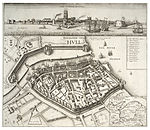Kingston upon Hull College of Education
1913 establishments in EnglandHigher education colleges in EnglandHistory of Kingston upon HullTeacher training colleges in the United KingdomUniversities and colleges established in 1913 ... and 1 more
Use British English from April 2020
Kingston upon Hull College of Education was founded in 1913 as the "Hull Municipal Training College". The college had numerous name changes until September 1976 when it merged with the Hull College of Higher Education, which ultimately formed part of the University of Lincoln. The stimulus for the formation of the college was in response to a shortage of certified teachers in the city's schools. The college-trained teachers and educationalists for the city and beyond followed an ethos which was primarily set by Cyril Bibby, principal between 1959 and 1977. The college's first principal was Helen Todd.
Excerpt from the Wikipedia article Kingston upon Hull College of Education (License: CC BY-SA 3.0, Authors).Kingston upon Hull College of Education
Alfred Gelder Street, Hull Old Town
Geographical coordinates (GPS) Address Nearby Places Show on map
Geographical coordinates (GPS)
| Latitude | Longitude |
|---|---|
| N 53.744 ° | E -0.332 ° |
Address
Combined Court Centre
Alfred Gelder Street
HU1 2EZ Hull, Old Town
England, United Kingdom
Open on Google Maps









